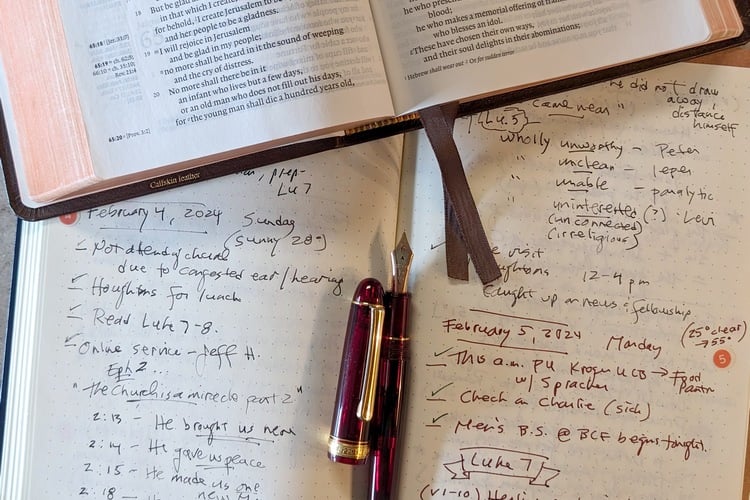Afterwords -- journaling

"When your children ask their fathers in times to come, 'What do these stones mean?' then you shall let your children know, ‘Israel passed over this Jordan on dry ground.’" (Joshua 4:21-22)
"Take care then how you hear, for to the one who has, more will be given, and from the one who has not, even what he thinks that he has will be taken away.” (Luke 8:18)
February 15, 2024
Dear friends,
This week a friend approached me about journaling and asked for some suggestions. I was going to write him an email but decided to make this the topic of this week's newsletter. (Lucky you!)
I write in my journal regularly, nearly every day. I make note of the date, weather, activities, and people I've met or visited with. I'll note what I've read and heard, such as, sermon notes or quotations from my reading or audiobooks. Mostly, my writing ends up being about my daily Scripture reading. Sometimes I write out entire verses, and for me it's an important way to implant every word of the text in my mind and on paper, using both my eyes and hands. Usually, I write first thing in the morning. I don't do emails or social media until later in the day.
For me a journal is a record of how God is dealing with me and what I'm learning as I walk with him. I write down verses which stand out in my Bible reading, passages that the Holy Spirit illumines to me. This ongoing teaching ministry of the Lord through his Word and Spirit is vital for our life in the Lord (Isa 54:13; Jer 31:33; 119:18; Luke 8:16-18; Eph 1:17-18; Col 1:9; Heb 8:11). The assumption for me is, the Lord is teaching me through what I read and am experiencing. The Psalmist wrote, "The unfolding of your words gives light; it imparts understanding to the simple." (Psalm 119:130) And "...they will all be taught by God..." (John 6:45) Even my thoughts during the night are notable: "I bless the LORD who gives me counsel; in the night also my heart instructs me." (Psalm 16:7)
Since I am prone to forgetfulness, my journal is a way to remember those thoughts and insights. Like memorial stones in the biblical narrative -- placed by characters who wanted to remember God's dealings with them -- my journal is a kind of artifact that I hope to pass on to my children. I want them to know how the Lord was dealing with me in his grace and kindness.
I write in A5-sized (roughly 6"x8") hard-backed journals which I keep on my bookshelf, organized by year. I've used Rhodia and Leuchtherm journals for their fountain-pen friendly paper (which does not feather or bleed-through the ink). I haven't had good success with Moleskine paper. The reasonably-priced journal by Artist's Loft (at Michael's) is a good option, too.
And there is a fun factor to it all, as well. I write with fountain pens with different colors of ink. Sometimes I doodle or use stickers. If you are just starting out with fountain pens, try one of these for starters: the Pilot Metropolitan, the Platinum Preppy, or the Lamy Safari.
HELPFUL LINKS.
-- What's the difference between a journal and a commonplace book?
-- Here are reputable pen, ink, and paper supply companies that I deal with: The Goulet Pen Company, Jetpens, and Anderson Pens.
-- Among the "smaller pleasures of this world I count this pleasure: the pleasure of taking up one's pen." (Hilaire Belloc, 1907) Hear this essay read by Malcolm Guite.
That's it for this week!
Sandy
Image credit: photo above of memorial stones, source unknown; photo below of my current journal. Unless otherwise indicated, all Scripture quotations are from The ESV Bible (The Holy Bible, English Standard Version), copyright 2001 by Crossway, a publishing ministry of Good News Publishers. Used by permission. All rights reserved.
